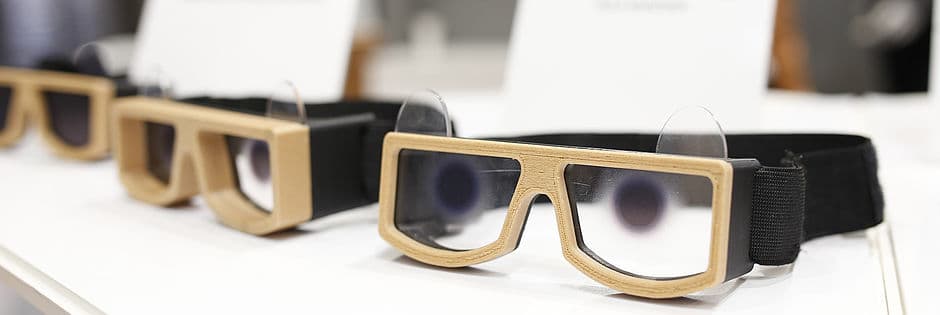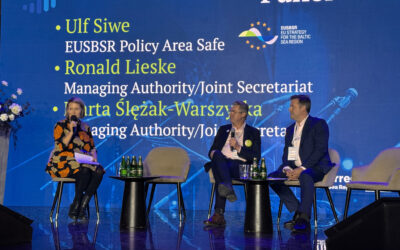It is said that people lose one cm of their height with every decade after turning 40. At some point, a favourite cup placed in the kitchen’s upper cupboard can become out of reach and a comfortable armchair is suddenly too high. These and other physical limitations may appear trivial to a young and healthy 20-year-old but they are a real challenge to an elderly person who wants to stay independent as long as possible. The BaltSe@nioR project creates fascinating possibilities to learn about various physical limitations of an aging body in order to translate them into innovative business opportunities across the Baltic Sea countries.
Feels like 65
BaltSe@nioR attempts to confront some of the consequences of the aging society in the Baltic Sea region. Although almost 20% of the EU population is 65 years old or more, and there are some products designed for seniors, this market has not reached its full potential yet. The project addresses a niche in furniture and interior design for seniors in order to trigger innovative and smart solutions that would increase seniors’ comfort and security in their home environment. The project is a joint venture of partners from nine countries (Denmark, Germany, Estonia, Finland, Latvia, Lithuania, Norway, Poland, Sweden) representing traditional wood and furniture industries but also social sciences, robotics, engineering and Information and Communication Technologies (ICT).
“It is very difficult to imagine what it feels like to be 65 years old or more. That’s why we created a prototype of an age simulator that enables to experience selected physical limitations of an aging human body, for example a different posture, weakened muscles and limited range of motion of arms or legs,” says Dr Beata Fabisiak from Poznań University of Life Sciences, lead partner of the BaltSe@nioR project. “The simulator supports the empathy phase in the product development process. In the following months, we will test it within our Baltic Sea region’s partnership.” Next, the 3D model of the age simulator as well as glasses imitating various eye illnesses typical for an older age will be shared with companies ready to take up the challenge of comprehending and responding to the special needs of the elderly.

© Get Models Now
Knowledge to share
“Our idea is to create an extensive database of knowledge on senior population in all countries of the Baltic Sea region.” A pilot research held under the StarDust project indicated that 90% of interviewed seniors in Poland lack kitchen furniture that would meet their needs. BaltSe@nioR expands the scope of that research by peering into seniors’ houses in nine countries of the Baltic Sea region to observe similarities and differences in lifestyles: Do seniors live in multi-generation households? How many rooms are there? Do they live alone? What furniture do they use and how? What are the most comfortable furniture dimensions? What is their health condition? The virtual library will combine expertise from the various fields provided by the project partners in different countries.
Apart from scientific data, the library will make the age simulator and glasses imitating eye illnesses available for full 3D print to any BSR enterprise interested in furniture design and production for seniors. In this way, the library will help companies verify the particular needs of seniors in a given country, adjust their offer and more easily enter foreign markets.
Be smart and be good
BaltSe@nioR goes beyond the traditional furniture design deeply rooted in e.g. Germany and Poland by inviting experts in robotics, engineering and ICT from other countries to cooperate and actively shape the future of the furniture industry for seniors. The concept of smart furniture is entering European households and BaltSe@nioR is giving it a try by integrating new technologies into furniture production and, for example, designing a smart armchair that would measure blood pressure.
Practical exchange and testing of different product development methods during common working sessions is how project partners discover innovative solutions in various fields from other countries. A series of design workshops engages students, designers, wood technologists, companies and alike from BSR countries. Based on the workshops’ results, BaltSe@nioR will create manuals and tutorials to steer innovation and creative design in furniture production better, and in this way increase the competitiveness of SMEs in the region.
Made with care
BaltSe@nioR conducts a series of furniture testing in specialised laboratories in Estonia and Poland in order to work out the standards in safety for furniture for seniors, similar to those applicable to children’s furniture. Laboratory tests focusing on durability, stability and proper dimensions will afterwards be validated by seniors among others in Lithuania who will test them for comfort. In the longer run, BaltSe@nioR will develop labelling and proposals of certification procedures and documentation for furniture designed for seniors that can constitute the basis for further works on European Safety Standards for furniture for seniors. Additionally, BaltSe@nioR is working on tools that will help calculate optimal warranty periods for newly designed cabinet furniture. The computer application supporting reliability-based furniture design will be available in the virtual library.
High interest in the project’s activities – the virtual library in particular – and growing involvement of SMEs prove the importance of the issue BaltSe@nioR deals with. The need for ensuring comfort and safety of seniors is acknowledged as a shared challenge for the whole Baltic Sea region and beyond, which BaltSe@nioR skillfully turns into a fine springboard for introducing innovative and smart solutions. As part of the BSR Stars flagship project of the EU Strategy for the Baltic Sea Region, BaltSe@nioR makes its own contribution to the innovative character of the region – an innovative region that becomes a better place for seniors.







